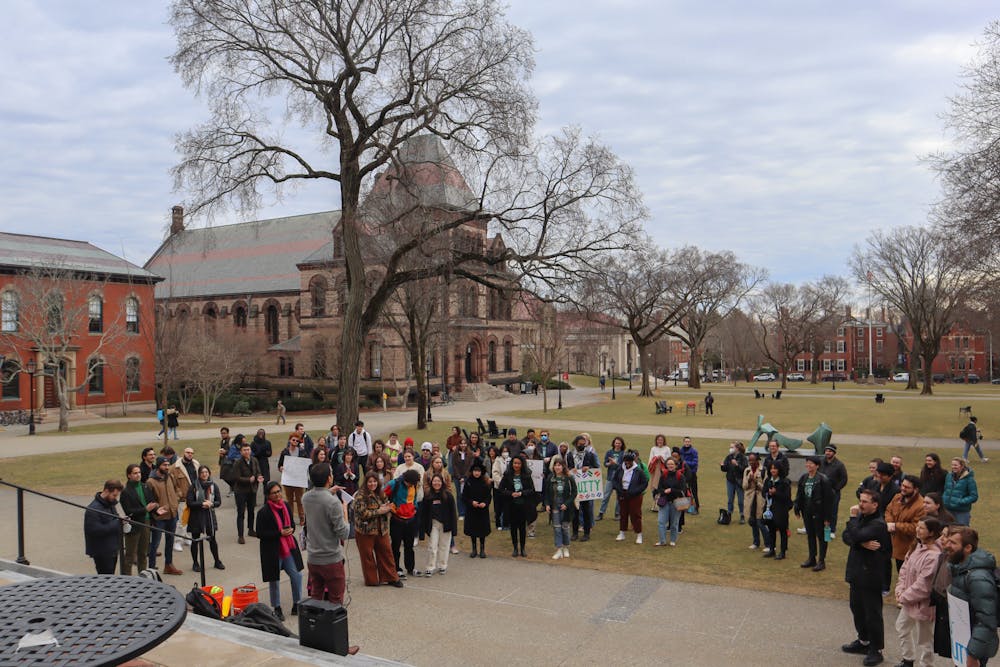The first renegotiation meeting between the Graduate Labor Organization and the University took place inside the Stephen Robert ’62 Campus Center Wednesday, marking the start of contract renegotiations.
Ahead of the contract’s expiration at the end of June, all 15 articles of the contract will be up for review for the first time since its inception in 2020, The Herald previously reported.
Over 100 graduate students were present at the first round of negotiations, said Jeff Feldman GS, a member of GLO’s organizing committee, after the meeting’s conclusion. The meeting was open to GLO members.
“It was amazing to see,” they said, noting that graduate students showed up “for better wages, benefits and working conditions.”
“Representatives from the administration responded to GLO’s presentation and comments respectfully and constructively,” Feldman added. “I hope that continues to be the case throughout the bargaining process.”
To display public support for the union in negotiations, GLO members and supporters rallied around the steps of the Campus Center Wednesday morning.
During the rally, GLO representatives encouraged organization members to attend the bargaining sessions as silent observers and noted that the University seemed receptive to accommodating a large audience of graduate students. According to GLO President Sherena Razek GS, the administration booked a room that can hold “hundreds of grad observers.”
Feldman added that attendees who aren’t on the bargaining committee would be “disciplined, orderly and respectful of the bargaining process” and that designated marshals would “remind people to not be distracting and help people make their way through the room if they have to leave.”
Graduate School Executive Dean of Administration and Finance Ethan Bernstein declined to comment on the ongoing negotiations in an email to The Herald.
Previously, University Spokesperson Brian Clark wrote to The Herald that the University is “working together collegially with the grad student representatives and doing our best to reach that contract.”
‘Brown University doesn’t run without us’
The rally featured four speakers from GLO — Adit Sabnis GS, Shreya Singh GS, Victoria Antonetti GS and Feldman — who drew an enthusiastic response from the crowd and prepared the graduate students for the bargaining session.
Sabnis kicked off the event by outlining the union’s demands, including improvements to health care coverage, mental health care, COVID-19 protection, parental support, stipend raises that outpace inflation and protection against discrimination and harassment.
Sabnis focused in particular on the union’s platform of accessibility and compensation equity — a message reflected in the paper signs and cheers of audience members.
“Grads should never be forced to choose between their careers and their children,” Sabnis said. “They deserve childcare support for their children. They deserve to have their children as 100% dependents on their health care plans.”
GLO’s current contract provides a 75% subsidy for health care and dental care premiums for dependents.
“We need a stipend that’s fair to everyone, a stipend that doesn’t assume that everyone has intergenerational wealth to fall back on,” he added. “We deserve a process that meaningfully guards us against discrimination, and we deserve it in writing in our contracts.”
For the 2023 fiscal year, GLO members will receive a stipend of $42,411.
Antonetti, a co-chair of the bargaining committee, described GLO’s approach to preparing for negotiations in her speech.“We scoured through contracts from other universities to see what precedents exist elsewhere that don’t exist here,” she said. GLO organizers also consulted hundreds of graduate students in designing their platform, according to Feldman.
“Student unionizing is really a national thing,” Jack Quirk GS told The Herald, noting that GLO has borrowed tactics from Princeton’s graduate student union. “It’s really important that the union keeps talking to unions elsewhere.”
“Without us, classes won’t run, exams won’t get graded, research grants won’t get fulfilled. Brown University doesn’t run without us,” added Sabnis, before ending the rally with a chant: “Get up, get down, Providence is a union town.”
The rally created a “moment for grads to come together and demonstrate our strength in numbers,” Razek told The Herald. “Our power comes from unity and solidarity amongst grad workers. The more people we can get engaged in this process, the stronger we’ll be and the more muscle we can put behind the proposals that we're passing at the table.”
Graduate student attendees expressed their enthusiasm for past union gains and the prospect of further progress.
“We won this amazing raise last year, which has made a huge difference, and I think that's been a sort of victory,” Arnav Adhikari GS said, but added that graduate students should “still keep an eye on where things can improve.”
‘Our working conditions are undergraduate learning conditions’
Beyond drawing support from graduate students, the rally also built awareness about the renegotiation process through the broader community, Razek said.
“Our working conditions are undergraduate learning conditions,” she said.
The rally drew students from the undergraduate Teaching Assistant Labor Organization — which, if it forms successfully, will become part of GLO — as well as members of Students for Justice in Palestine, which rallied outside the Corporation meeting with GLO on Friday, The Herald previously reported.
Colton Rusch ’23, a member of TALO’s organizing committee, said he attended “to show solidarity for our fellow workers in GLO who we are unionizing with."
Jada Wooten ’24 also came to the rally with a broader unionization effort in mind. “I know GLO was a big source of support for the CS TAs,” she said. “I think it’s exciting how GLO and TALO can fight for the rights of all TA workers on campus.”
Others, like Maru Attwood ’24, chose to attend the rally because “graduate students make this campus run. We, as undergrads, benefit a huge amount from their labor.”
“I think there's a resurgence of student activism and student worker activism on Brown’s campus,” Razek said. “We're all really talking to each other, and it's really empowering to see the students and workers on this campus, who actually comprise this community, coming together to make sure we have a say in how things are run at Brown.”
Correction: A previous version of the story misquoted Colton Rusch ’23. The Herald regrets this error.

Katie Jain is a University News editor from New Jersey overseeing the graduate student life beat. She is a senior concentrating in International and Public Affairs and History.





